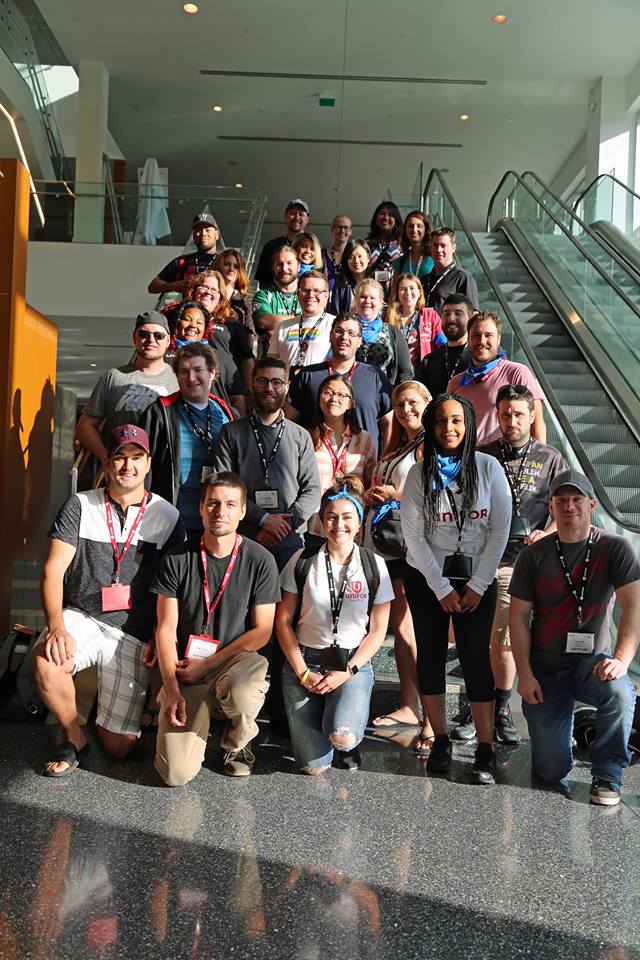If you feel like you’re crumbling under today’s challenges, you’re not alone.
It’s exhausting to live through these unprecedented times. For many workers, every day brings new challenges and news that is difficult to absorb.
Unifor Young Workers have been calling all members to action by saying: Our Future is Worth the Fight! It’s during the most challenging times that we need an organized, sustained and bold labour movement. Without it, workers won’t be able to put forward progressive demands that benefit everyone.
So…Don’t Agonize, ORGANIZE!
Here are 10 ways to build your skills and contribute to the movement for economic, racial and social justice wherever you are.
1. Talk to humans
The basis for any social change is to move people from point A to point B, to change their perception on an issue and to get them closer to action. Whether you’re discussing migrant issues with a relative, talking to your neighbor about affordable housing, or engaging a co-worker about the need for improved ventilation in the workplace, the best way to go about it is to get beyond the screen and talk to them. We need to create more opportunities to build trust and connections with real people. Log off and talk to humans.
2. Practice door-knocking
If you’ve ever been part of an organizing or political campaign, you know the importance of door-knocking. Many young activists find this daunting because it requires you to engage directly with people, at the doorstep, about certain topics that can sometimes be difficult to talk about. The easiest way to practice is to sign up as a volunteer for a campaign or a candidate you care about. If it’s your first time, don’t worry. You will be paired up with a seasoned campaigner. They will give you talking points. Practice door-knocking and you’ll be amazed at the conversations it will lead to. Just remember, never door-knock alone!
3. Know the issues
We live in a world where information is abundant, but can sometimes be overwhelmingly noisy. The strongest way to make the case for an issue is to know your facts. Research the issue, explain why you care, and be a strong voice to advocate for change. Rely on experts to build your knowledge and make sure you know what your opponents will say. Knowledge is power!
4. Tap into your talents
Our movements need the contribution of many different people to grow stronger. Do you have artistic and creative talents? Do you naturally love speaking to people? Are you tech-savvy or apt at using social media? Do you play an instrument? Can you build things? Whatever your talents, seek opportunities to put them to good use in our movements. You’ll also make your contribution more fun!
5. Follow your union
Unifor represents 315,000 members across Canada, in dozens of sectors and hundreds of workplaces. We are a voice for working people and we advocate on many fronts on any given week. Make sure to follow your union wherever we put updates: on the website, on Facebook, Twitter, Instagram and YouTube. Amplify our reach!
6. Connect to existing groups
If you are new to a specific campaign or issue, figure out what other groups or individuals are already playing an active role. Many have likely been working on the issue for some time and offering help and support is often more helpful than starting efforts on your own. We need solidarity, not division. Reach out to other groups and activists, and make use of your network!
7. Ask for help
Nobody is expected to know everything! If you need help, ask for it. There are seasoned campaigners, long-time union activists, elected leaders and many others who can provide advice and ideas for a way forward.
8. Build a team
“A small group of thoughtful and committed individuals can change the world – it’s the only thing that ever has!” said American anthropologist and activist Margaret Mead. Building a team is a skill – one that is required in order to recruit and activate people to work collectively. Find your people, build your team, and together, you’ll change your workplace, your community and even the world!
9. Remove barriers
Union activists have to be careful when blaming others for not showing up to different events or campaign activities. Too often, activists will fail to identify barriers that may prevent others from participating, attending or being more involved in a project. Systemic racism, sexism and a culture of discrimination can be a barrier to participation. Meetings held in the evening without adequate child care options in place can be a barrier to participation. Inaccessible spaces and settings can be a barrier to participation. There are many factors that can exclude individuals – our goal is to identify and remove them. Read “So you want to engage young workers” for more ideas about removing barriers to participation.
10. Dream big
In a world where isolation and despair sometimes overpower hope and joy, imagination is an act of resistance. It is up to us to imagine a better future, to imagine the healthy and safe spaces for our friends and loved-ones to gather. Imagine the power of people coming together. Now is the time to think about the world we want to live in and fight for it every day.
Here’s one last tip – the 11th one. Look after yourself! None of what we do as activists should take priority over your physical and mental well-being. It’s a long fight. Don’t forget to log off, change the channel once in a while and take good care of yourself.
Get involved with Unifor Young Workers and support Our Future is Worth the Fight.



